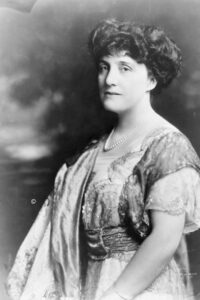
Love Stories
The Probationer’s name was Nella Jane Brown, but she entered the training school as N. Jane Brown. However, she meant to be plain Jane Brownwhen she was accepted —not, of course, that she could ever be plain.
People outside of hospitals have a curious theory about nurses, especially if they are under twenty. They believe that they have been disappointed in love. They never think that they may intend to study medicine later on, that they may think nursing is a good and honorable career, or that they may like to care for the sick.
The man in this story had the theory very hard.
When he opened his eyes after the wall of the warehouse dropped, N. Jane Brown was sitting beside him. She had been practicing counting pulses on him, and her eyes were slightly upturned and very earnest.
There was a strong odor of burnt rags in the air, and the man sniffed. Then he put a hand to his upper lip—the right hand. She was holding his left.
“Did I lose anything besides this?” he inquired. His little mustache was almost entirely gone. A gust of fire had accompanied the wall.
“Your eyebrows,” said Jane Brown.
The man—he was as young for a man as Jane Brown was for a nurse—the man lay quite still for a moment. Then:
“I’m sorry to undeceive you,” he said. “But my right leg is off.”
He said it lightly because that is the way he took things. But he had a strange singing in his ears.
“I’m afraid it’s broken. But you still have it.” She smiled. She had a very friendly smile. “Have you any pain anywhere?”
He was afraid she would go away and leave him, so, although he was quite comfortable, owing to a hypodermic he had had, he groaned slightly. He was, at that time, not particularly interested in Jane Brown, but he did not want to be alone. He closed his eyes and said feebly:
“Water!”
She gave him a teaspoonful, bending over him and being careful not to spill it down his neck. Her uniform crackled when she moved. It had rather too much starch in it.
The man, whose name was Middleton, closed his eyes. Owing to the morphia, he had at least a hundred things he wished to discuss. The trouble was to fix one out of the lot.
“I feel like a bit of conversation,” he observed. “How about you?”
Read or download Book
Mary Roberts Rinehart
Mary Roberts Rinehart (August 12, 1876 – September 22, 1958) was an American writer, often called the American Agatha Christie. Rinehart published her first mystery novel The Circular Staircase in 1908, which introduced the “had I but known” narrative style. Rinehart is also considered the source of the “the butler did it” plot device in her novel The Door (1930), although the exact phrase does not appear in her work. She also worked to tell the stories and experiences of front-line soldiers during World War I, one of the first women to travel to the Belgian front lines.
Biography
Rinehart was born Mary Ella Roberts in Allegheny City, Pennsylvania, now a part of Pittsburgh. A sister, Olive Louise, four years Mary’s junior, would later gain recognition as an author of children’s books and as a nationally syndicated newspaper columnist. Her father was a frustrated inventor, and throughout her childhood, the family often had financial problems. Her father committed suicide when Mary was 19 years old. Tending to be left-handed at a time when that was considered disadvantageous, she was trained to use her right hand instead.
She attended public schools and graduated at age 16, then enrolled at the Pittsburgh Training School for Nurses at Pittsburgh Homeopathic Hospital, where she graduated in 1896. She described the experience as “all the tragedy of the world under one roof.” After graduation, she married Stanley Marshall Rinehart (1867–1932), a physician she had met there. They had three sons: Stanley Jr., Alan, and Frederick.
During the stock market crash of 1903, the couple lost their savings, spurring Rinehart’s efforts at writing as a way to earn income. She was 27 that year and produced 45 short stories. In 1907, she wrote The Circular Staircase, the novel that propelled her to national fame. According to her obituary in the Pittsburgh Post-Gazette in 1958, the book sold 1.25 million copies. Her regular contributions to The Saturday Evening Post were immensely popular and helped the magazine mold American middle-class taste and manners.
In 1911, after the publication of five successful books and two plays, the Rineharts moved to the Pittsburgh suburb of Glen Osborne, where they purchased a large home at the corner of Orchard and Linden Streets called “Cassella.” Before they could move into the house, however, Mrs. Rinehart had to have it completely rebuilt because it had fallen into disrepair. “The venture was mine, and I had put every dollar I possessed into the purchase. All week long I wrote wildly to meet the payroll and contractor costs,” she wrote in her autobiography. In 1925, the Rineharts sold the house to the Marks family; the house was demolished in 1969. Today, a Mary Roberts Rinehart Nature Park sits in the borough of Glen Osborne at 1414 Beaver Street, Sewickley, Pennsylvania.
Rinehart’s commercial success sometimes conflicted with her expected domestic roles of wife and mother, yet she often pursued adventure, including a job as a war correspondent for The Saturday Evening Post at the Belgian front during World War I. During her time in Belgium, she interviewed Albert I of Belgium, Winston Churchill, and Mary of Teck, writing of the latter “This afternoon I am to be presented to the queen of England. I am to curtsey and to say ‘Your majesty,’ the first time!” Rinehart was working in Europe in 1918 to report on developments to the War Department and was in Paris when the armistice was signed.
In 1922, the family moved to Washington, DC, when Dr. Rinehart was appointed to a post in the Veterans Administration. She was a member of the Literary Society of Washington from 1932 to 1936. Her husband died in 1932, but she continued to live in Washington until 1935 when she moved to New York City. There she helped her sons found the publishing house Farrar & Rinehart, serving as its director.
She also maintained a vacation home in Bar Harbor, Maine. In 1947, a Filipino chef who had worked for her for 25 years fired a gun at her and then attempted to slash her with knives until other servants rescued her. The chef committed suicide in his cell the next day.
Rinehart suffered from breast cancer, which led to a radical mastectomy. She eventually went public with her story, at a time when such matters were not openly discussed. The interview “I Had Cancer” was published in a 1947 issue of the Ladies’ Home Journal; in it, Rinehart encouraged women to have breast examinations.
Rinehart received a Mystery Writers of America special award a year after she published her last novel and an honorary doctorate in literature from George Washington University.
On November 9, 1956, Rinehart appeared on the interview program Person to Person. She died at age 82 at her apartment at 630 Park Avenue in New York City.






